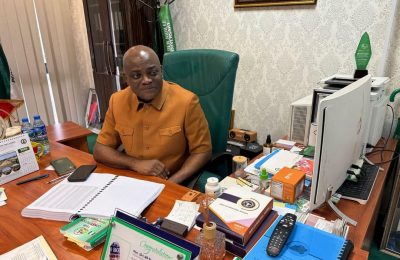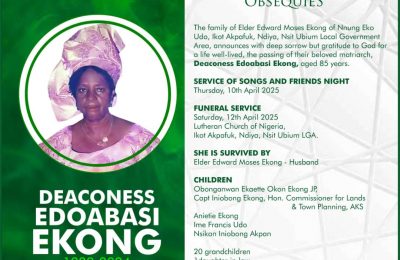IT is a common parlance in politics that deputies are seen but not heard. The temperance which must be exercised by them is such that Sir Edward Playfair once said of persons in similar roles as having “one of the least exciting jobs that no man of spirit can do for long.” While this may be true for some, a few men of substance understand that he must be willing to be led who must lead. A few lucky ones who take this path are ultimately called to leadership. Such is the story of Governor Lucky Orimisan Aiyedatiwa, a man of immense substance whose sincere passion was the biggest bane in his former role. While his passion is not in conflict with his principal’s, the amiable late former Governor, Olurotimi Akeredolu, impacting the people of Ondo State without breeding misconception has been one of his biggest tests. Now that Governor Aiyedatiwa has the mantle, the stage is set to bring into fruition all the progressive thinking and visionary ideas that have been part of him since his foray into politics.
The governor’s chosen path in education betrays his sentiment towards the operationalisation of ideas. From an advanced diploma in Business Administration, he obtained yet a higher certification in Business Management from the Pan-African University, Lagos. Still willing to improve his preparedness, he had completed a Master’s Degree in Business Administration from the University of Liverpool. Beyond his demonstrated ability to deliver as he did for himself in his own business as MD of the Blue Wall Group of Companies, one is bound to shed any doubtfulness in the fact that he was appointed at defining moments to positions no governor would experiment with, on two occasions- the positions of the federal commissioner representing Ondo State on the Board of the Niger Delta Development Commission followed by the position of the Deputy Governor. For the many who have enjoyed the governor’s company, his passion is easily communicated: the welfare of the people. This in my opinion is an excellent summation of what should be the objective of a great leader. The development of human capital with a focus on wealth creation and happiness is an encompassing task which is achievable through strategic, purpose-built plans that are already in the governor’s operational model.

Governor Aiyedatiwa has assumed office at a moment Ondo State is at the crossroads. The state’s relevance to the president’s bold vision at this time was exemplified by the establishment of the Ministry of Blue Economy, among other gestures such as the approval of the Deep Sea Port by the president’s predecessor. It is yet unknown if the state will fall off or soar to become one of the four economic power houses of the country. Now is the time to grab the opportunities available with both hands. When seen through untrained eyes, it is as though welfare and big doings are exclusive of each other but I opine they are not, and the opportunities of the times we find ourselves in can be streamlined for the maximum benefit of the people. No one understands this better than Governor Aiyedatiwa, who is acquainted with the history of the NDDC under which he once served. Big doings often do not translate into better welfare for the people. Consequently, the contempt which the local people have for heavy vehicles making their ways into their communities, and the sight of big stones and cranes all tell the story of opportunity not optimised.
The result of uncritical planning shows quickly. One can spot it in the disconnect which is often observed even in the communities in which developmental projects are sited. Successive governments at the federal level have encountered difficulty solving the problem. What they kept having were commissions under different names and creeds. I vote that the macro-economics of the state should be expanded, even prioritized, but add that the welfare of the people can be a by-product of every single activity in that regard. The lesson of the Niger Delta, which at one time devolved into a serious security issue for the country, is important. The moral and economic riddle of paying citizens who have no merit or immediate relevance to set objectives will continue to be a deciding factor in who history will judge fairly among leaders. Quality leaders make the right policies, and this is partly why I repose my confidence in the governor now and in the coming general election.
Success in administration is not as mysterious as past and contemporary experiences make it seem- it is a true character and the capacity to truly empathise that is missing. After the celebrated recommendations of William Easterly, the ex-World Bank economist and author of The White Man’s Burden, one would think that the administrators of this world would have finally attained the ultimate insight. Not so fast. Easterly carefully illustrated in his book how successive efforts at mitigating the dire conditions of the world’s poor have consistently failed. Very much like our own editors of the book about the Niger Delta titled Placebo as Medicine, Kiikpoye and Dawari, Easterly showed how preoccupation with own ideas is the bane in achieving true human development. It is not enough for the political leadership to have a vision, a rounded approach towards development, and the ability to respect the yarning of the people makes the difference. As Easterly argued, people often prove to be their own experts- and the kind of market which they adopt to address their unique situations is often the type of solution that government should adopt in its developmental programme. Failure to learn from these examples has been cited by increasing numbers of modern development scholars as the reason why government programmes fail.
It is important that the government listens to the aspirations of its people, yet the act of listening is not a strategy by itself. The very notion of listening once devolved into the type of populism that was practiced by Hugo Chávez’s Venezuela may land governments into even more dare situations. The formula is therefore having not just one single formula but several that are adaptable to each unique objective. Inductive approach to problem-solving is more likely to boost happiness in the populace. It is when this bottom-up method is applied that such misapplication of development that is usually the characteristic of ineffective governance can be curbed. Developmental programmes that draw from the counsel of true research will yield the best results. With this approach to governance, the right interventions will be made and translate to real progress and happiness for the people.
In a nutshell, I must reiterate that character is how this eclectic approach to administrative methodology is possible- the type of character that is exemplified by the businessman in his effort at meeting the demands of the market. Permit me to say again that Governor Aiyedatiwa’s experience, particularly his proficiency in business methodology, is why I consider Ondo State lucky. It takes character to feel the pulse of the people and to apply development judiciously. When a state governor possesses the moral capacity to empathise, it becomes easy to yield to the counsel of trusted economists the world over who subscribe to this modern approach to change making.
- Kolawole, a developmental economist and national coordinator of Nigerian Intellectuals for Tinubu-Shettima, writes in from the United Kingdom







